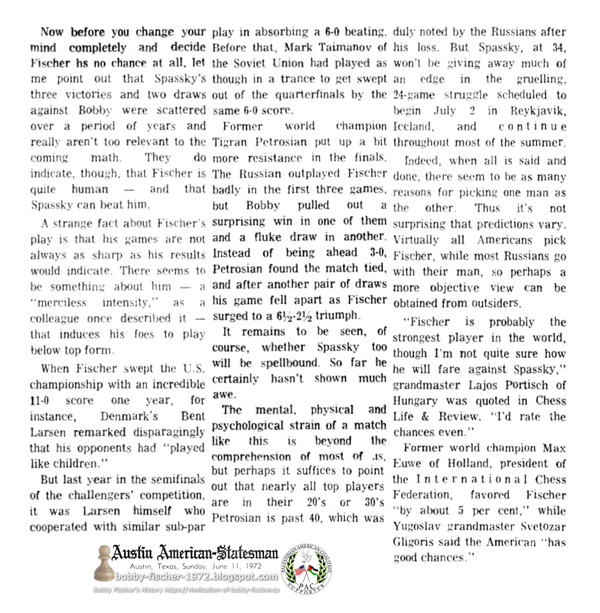Austin American-Statesman Austin, Texas Sunday, June 11, 1972 - Page 21
World Title Match Rated Tossup by Chess Experts
When Bobby Fischer was asked how he'd take a defeat in his coming world championship chess match, the brash American challenger replied: “If I lose, I won't be upset, because I'll know it was a fluke.”
Remarks such as these, combined with Fischer's phenomenal success over the past couple of years, have lulled many Americans into believing that he can't be beaten. In their minds, the result of his match with champion Boris Spassky of the Soviet Union is a foregone conclusion.
But don't let last year's games or Fischer's egomania fool you. Upsets are always possible in any kind of competition. Furthermore, it's not really clear just how much of a surprise a Spassky victory would be.
To be sure, Fischer has dominated the international scene lately, scoring an easy triumph in the qualifying tournament and then winning three straight matches by lopsided scores to earn the challenger's role.
In Spassky, however, the 29-year-old American will be meeting a much tougher for than any of those he has disposed of so far. No one follows the long and arduous road to the summit without being a great player, and Spassky got there three years ago by beating some of the same people Fischer did this time.
If all this doesn't convince you that Fischer is in for a fight, consider one more fact. The two have already met five times in various competitions, and Bobby is still looking for his first victory.
Now before you change your mind completely and decide Fischer has no chance at all, let me point out that Spassky's three victories and two draws were scattered over a period of years and really aren't too relevant to the coming match. They do indicate, though, that Fischer is quite human — and that Spassky can beat him.
A strange fact about Fischer's play is that his games are not always as sharp as his results would indicate. There seems to be something about him — a “merciless intensity,” as a colleague once described it — that induces his foes to play below top form.
When Fischer swept the U.S. championship with an incredible 11-0 score one year, for instance, Denmark's Bent Larsen remarked disparagingly that his opponents had “played like children”.
But last year in the semifinals of the challengers' competition, it was Larsen himself who cooperated with similar sub-par play in absorbing a 6-0 beating. Before that, Mark Taimanov of the Soviet Union had played as though in a trance to get swept out of the quarterfinals by the same 6-0 score.
Former world champion Tigran Petrosian put up a bit more resistance in the finals. The Russian outplayed Fischer badly in the first three games, but Bobby pulled out a surprising win in one of them and a fluke draw in another. Instead of being ahead 3-0, Petrosian found the match tied, and after another pair of draws his game fell apart as Fischer surged to 6½-2½ triumph.
It remains to be seen, of course, whether Spassky too will be spellbound. So far he certainly hasn't shown much awe.
The mental, physical and psychological strain of a match like this is beyond the comprehension of most of us, but perhaps it suffices to point out that nearly all top players are in their 20's or 30's. Petrosian is past 40, which was duly noted by the Russians after his loss. But Spassky, at 34, won't be giving away much of an edge in the grueling, 24-game struggle scheduled to begin July 2 in Reykjavik, Iceland, and continue throughout most of the summer.
Indeed, when all is said and done, there seem to be as many reasons for picking one man as the other. Thus it's not surprising that predictions vary.
Virtually all Americans pick Fischer, while most Russians go with their man, so perhaps a more objective view can be obtained from outsiders.
“Fischer is probably the strongest player in the world, though I'm not quite sure how he will fare against Spassky,” grandmaster Lajos Portisch of Hungary was quoted in Chess Life & Review. “I'd rate the chances even.”
Former world champion Max Euwe of Holland, president of the International Chess Federation, favored Fischer “by about 4 per cent,” while Yugoslav grandmaster Svetozar Gligoric said the American “has good chances.”


























